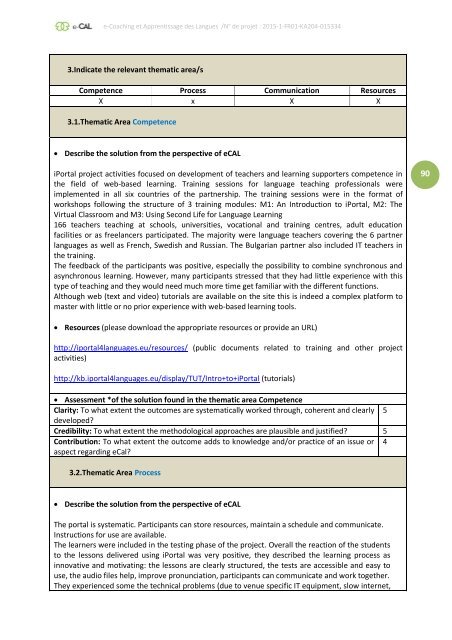e-CAL - e-Coaching et Apprentissage des Langues
The ERASMUS+ project e-CAL presents the result of an analysis of support methods in the case of language learning using web-based Open Educational Resources (OER).
The ERASMUS+ project e-CAL presents the result of an analysis of support methods in the case of language learning using web-based Open Educational Resources (OER).
You also want an ePaper? Increase the reach of your titles
YUMPU automatically turns print PDFs into web optimized ePapers that Google loves.
e-<strong>Coaching</strong> <strong>et</strong> <strong>Apprentissage</strong> <strong>des</strong> <strong>Langues</strong> /N° de proj<strong>et</strong> : 2015-1-FR01-KA204-015334<br />
3.Indicate the relevant thematic area/s<br />
Comp<strong>et</strong>ence Process Communication Resources<br />
X x X X<br />
3.1.Thematic Area Comp<strong>et</strong>ence<br />
Describe the solution from the perspective of e<strong>CAL</strong><br />
iPortal project activities focused on development of teachers and learning supporters comp<strong>et</strong>ence in<br />
the field of web-based learning. Training sessions for language teaching professionals were<br />
implemented in all six countries of the partnership. The training sessions were in the format of<br />
workshops following the structure of 3 training modules: M1: An Introduction to iPortal, M2: The<br />
Virtual Classroom and M3: Using Second Life for Language Learning<br />
166 teachers teaching at schools, universities, vocational and training centres, adult education<br />
facilities or as freelancers participated. The majority were language teachers covering the 6 partner<br />
languages as well as French, Swedish and Russian. The Bulgarian partner also included IT teachers in<br />
the training.<br />
The feedback of the participants was positive, especially the possibility to combine synchronous and<br />
asynchronous learning. However, many participants stressed that they had little experience with this<br />
type of teaching and they would need much more time g<strong>et</strong> familiar with the different functions.<br />
Although web (text and video) tutorials are available on the site this is indeed a complex platform to<br />
master with little or no prior experience with web-based learning tools.<br />
90<br />
Resources (please download the appropriate resources or provide an URL)<br />
http://iportal4languages.eu/resources/ (public documents related to training and other project<br />
activities)<br />
http://kb.iportal4languages.eu/display/TUT/Intro+to+iPortal (tutorials)<br />
Assessment *of the solution found in the thematic area Comp<strong>et</strong>ence<br />
Clarity: To what extent the outcomes are systematically worked through, coherent and clearly 5<br />
developed?<br />
Credibility: To what extent the m<strong>et</strong>hodological approaches are plausible and justified? 5<br />
Contribution: To what extent the outcome adds to knowledge and/or practice of an issue or 4<br />
aspect regarding eCal?<br />
3.2.Thematic Area Process<br />
Describe the solution from the perspective of e<strong>CAL</strong><br />
The portal is systematic. Participants can store resources, maintain a schedule and communicate.<br />
Instructions for use are available.<br />
The learners were included in the testing phase of the project. Overall the reaction of the students<br />
to the lessons delivered using iPortal was very positive, they <strong>des</strong>cribed the learning process as<br />
innovative and motivating: the lessons are clearly structured, the tests are accessible and easy to<br />
use, the audio files help, improve pronunciation, participants can communicate and work tog<strong>et</strong>her.<br />
They experienced some the technical problems (due to venue specific IT equipment, slow intern<strong>et</strong>,


